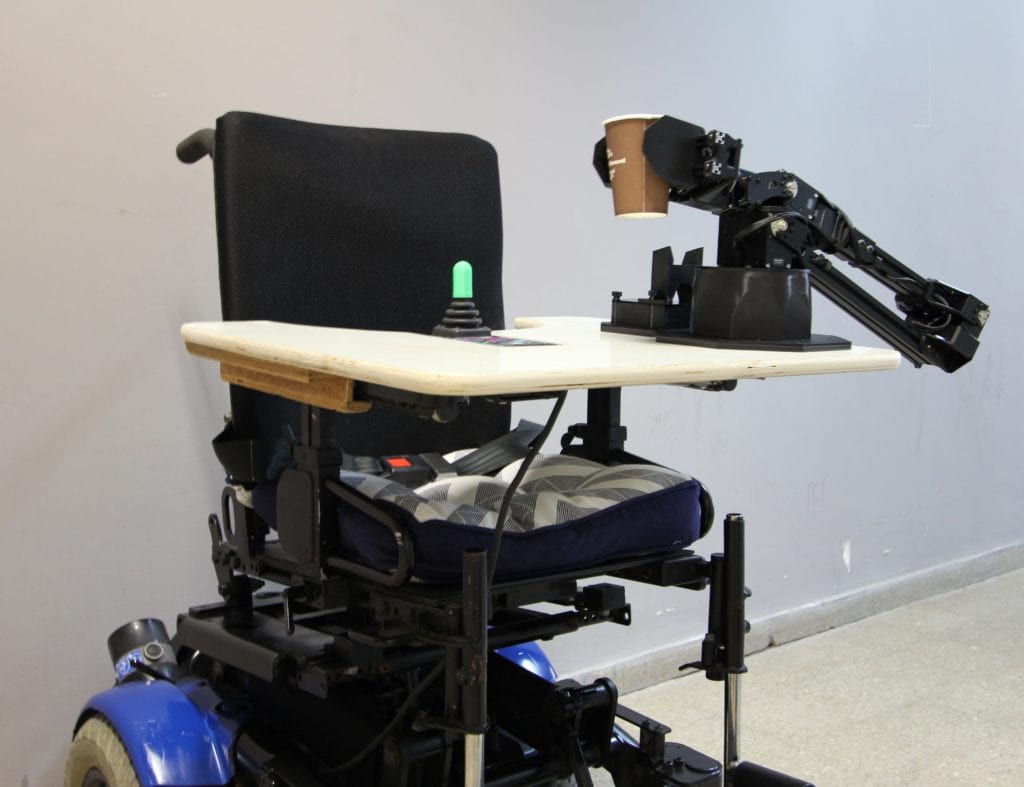Accenture and Intel are supporting a neuromorphic computing research project that is developing and testing a wheelchair-mounted robotic arm to assist patients with performing daily tasks.
Led by the Neuro-Biomorphic Engineering Lab (NBEL) at the Open University of Israel in collaboration with ALYN Hospital, a pediatric and adolescent rehabilitation center in Israel, the project is funded by Accenture through its participation in the Intel Neuromorphic Research Community (INRC).

Robotic Arm Features Adaptive Controls
Researchers from Accenture Labs and Intel Labs are working with researchers from Open University of Israel to build a wheelchair-mounted robotic arm with adaptive controls, using an algorithm developed by Applied Brain Research (ABR) and Intel’s neuromorphic computing hardware.
Wheelchair users will be able to independently control the robotic arm to perform daily tasks that require strength and dexterity of arms and hands, such as drinking from a glass, with 50% fewer errors and a 48% improvement in energy efficiency over traditional control methods. The device will undergo clinical testing and evaluation with patients at ALYN Hospital who rely on electric wheelchairs and have motor impairment of their upper extremities.
Studies suggest that wheelchair-mounted robotic arms provide an increased sense of independence for users, and that these assistive tools can reduce the need for caregiver time by up to 41%. Today, however, the cost of these devices is incredibly high, making them inaccessible to many people who need them, a media release from Accenture and Intel explains.
“The ability of robotic arms to benefit people today is largely limited due to high cost and excessive power consumption. This funding from Accenture, along with additional support from Intel and ABR, is allowing us to explore the implementation of adaptive controls on neuromorphic hardware in an effort to address the need for a collaborative, user-friendly, accurate robotic arm at a significantly reduced cost.”
— Elishai Ezra Tsur, lead project researcher at the Open University of Israel
Liohi Chip Shows Potential to Help Reduce Costs
The real-time learning capability of Intel’s neuromorphic research chip, Loihi, shows potential to reduce the cost of creating and operating assistive devices. By utilizing Loihi’s real-time learning, researchers predict they can implement adaptive control to enhance the arm’s functionality, while using affordable parts that could reduce the cost by more than 10x.
Because Loihi is up to 1,000 times more energy efficient than general purpose processors, a Loihi-based device could require less frequent charging, making it more ideal for use in daily life, the release continues.
“We believe that the development of a robotic arm based on neuromorphic computing can be a game-changer for people with disabilities. It could make it easier for them to engage with the community, boost their independence and grant them new employment opportunities.
The expected cost and performance improvements are potentially disruptive to this market. We are proud to lead this revolution together with the Open University, Intel and Accenture.”
— Arie Melamed-Yekel, general manager of ALYNnovation at ALYN Hospital
Accenture Labs and Intel Labs will leverage their experience in neuromorphic computing and artificial intelligence to assist the Open University research team with the development of the neuromorphic algorithm, as well as provide support for the design of the study.
“This research project is a powerful demonstration of the impact that neuromorphic computing can have on the development of affordable intelligent assistive devices. Making these devices accessible, particularly to such young patients, can have a profound impact on their independence, improving the way they live.
We are looking forward to teaming closely with the Open University of Israel researchers, ALYN and Intel, contributing our technical and industry experience to advance this technology for those who need it the most.”
— Edy Liongosari, Technology Innovation growth and strategy lead and chief research scientist at Accenture
“Neuromorphic computing is a natural fit for assistive technologies, given its low power requirements and ability to learn and adapt to new situations in real time. Through Intel and Accenture’s work with the Open University of Israel and ALYN Hospital, we hope to unlock new capabilities for mobility impaired children and improve the patients’ quality of life.”
— Mike Davies, director of Intel’s Neuromorphic Computing Lab
If this project is successful, the research team plans to explore how to produce the assistive robotic arm for patients, as well as explore applications of adaptive control technology in flexible manufacturing and industrial automation.
Intel and Accenture will continue to collaborate to identify and fund additional neuromorphic research that has the potential to advance the field, the release concludes.
[Source(s): Intel, Accenture, Business Wire]
Related Content:
New Resources Address Real-World Challenges of Living with Paralysis
Who Needs Fingers? Disabled Gamers Finally Get an Adaptive Controller
Robotic Arm Features Integrated Technologies Designed for Self-Help Rehab





